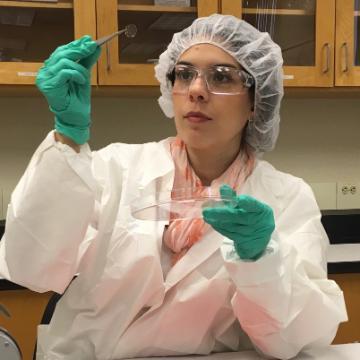
Graduate Profile: Laura Rivas Yepes, Bioengineering
Graduate student Laura Rivas Yepes has always wanted to contribute to society and improve quality of life, especially for people in developing countries like her native Colombia, and she sees bioengineering as the perfect career to help her do that. “The difficulty many people in rural areas in my country face in obtaining healthcare has motivated me to help provide solutions for improving access to medical attention. Additionally, my mom played an important role in choosing my career; she is a nurse and I always saw her passion to help patients. As she shared with me some situations at work, I started to be aware of the many medical problems that needed to be solved and decided to study bioengineering to contribute to solving those problems,” she said.
With an undergraduate degree in bioengineering and biomedical engineering from Escuela de Ingeniería de Antioquia, Rivas Yepes was attracted to Santa Clara University for her graduate study in part because of the Department of Bioengineering’s reputation for quality education and accessible faculty and partly because of SCU’s enviable location in the heart of Silicon Valley. “I knew I would get a personalized education and would have great connection to industry here; and that is exactly what my experience has been,” she said.
For most of the past year, Rivas Yepes has been working as a researcher in the Microfluidics Laboratory, advised by Assistant Professor Emre Araci. Using microfabrication techniques such as photolithography and soft lithography, she is designing and fabricating a wearable microfluidic strain sensor for human motion. A number of factors go into the design. What type of fluid to use, how the fluid channels are distributed on the device, and which material affords the highest sensitivity in a broad dynamic range are just a few of the considerations.
Eventually, the device can be implemented in a wide variety of ways, she said. “It can be used for physical therapy so a patient can get effective results without a trainer or therapist present. It can be used for patients with prosthetics to get a better sense of what is happening with the limb. It might also be used for robotic surgical applications or virtual reality.”
Rivas Yepes sees her research experience as a big plus. “Having the opportunity of hands-on experience examining customer needs, identifying and solving problems, designing experiments, comparing different options and building a prototype will help me, without a doubt, to perform in a better way in my career,” she said. In fact, it has already given her a leg up. A notice in her SCU email alerted her to an exclusive industry engagement day at Genentech last spring. With her credentials, she was selected to attend; this led to a summer internship, during which she applied and was selected to participate in an acceleration program where she received mentorship from the company’s senior group director of an oncology project.
Choosing the bioengineering master’s degree at Santa Clara University was a great decision, said Rivas Yepes, who expects to graduate in spring 2020. Recently, she and Dr. Araci patented a way to increase the sensitivity of the device she has been working on. “Doing research here can lead to ideas that end up in patents! It’s not always super easy to know how to find the research projects that are here, but if you are proactive, you can find them. If you have an idea, find a professor with expertise in that field and talk about it. A lot of people think the professors’ office hours are just for getting help with homework problems or concepts covered in class, but at Santa Clara the professors are very willing to discuss a wide range of topics and to help you get the most out of your time as an SCU graduate student.”